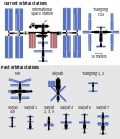Russian Orbital Service Station
 Layout | |
| Station statistics | |
|---|---|
| Crew | 2 or more |
| Launch | 2027 (planned)[1] |
| Carrier rocket | Angara A5 |
| Launch pad | Vostochny Cosmodrome |
| Orbital inclination | 98.0° |
| Typical orbit altitude | 400 km (planned) |
| External images | |
|---|---|
The Russian Orbital Service Station (Russian: Российская орбитальная служебная станция, Rossiyskaya orbital'naya sluzhebnaya stantsiya) (ROSS, Russian: РОСС)[3] is a proposed Russian orbital space station scheduled to begin construction in 2027. Initially an evolution of the Orbital Piloted Assembly and Experiment Complex (OPSEK) concept, ROSS developed into plans for a new standalone Russian space station built from scratch without modules from the Russian Orbital Segment of the ISS.[4]
Overview[edit]
In April 2021, Roscosmos officials announced plans to possibly exit from the International Space Station programme after 2024, stating concerns about the condition of its aging modules. On 26 July 2022, Roscosmos announced that the decision had been made to withdraw from the ISS programme after 2024.[5] A new space station, named Russian Orbital Space Station, operated entirely by Roscosmos, would be launched starting in the mid-2020s.[6][7][8]
ROSS will operate at a 400 km altitude Sun-synchronous orbit, which will allow it to monitor the entire surface of the Earth, especially the Arctic region.[9] This orbit will enable the station to serve two important functions: high-frequency observations of Russia from space, and easier access to the station compared to the ISS, which will allow for more medical and physiological experiments to be conducted than what is currently feasible on the Russian Orbital Segment of the ISS.[10]
Planned modules[edit]
NEM-1, also known as Science Power Module 1 (SPM-1), will be the core module of ROSS. Initially intended to be launched to the International Space Station in 2024, NEM-1 will instead undergo 1.5–2 years of redesign to prepare the module for its new role as part of ROSS. As of January 2023[update], NEM-1 is scheduled to launch in 2027[1] on an Angara A5 launch vehicle from Vostochny Cosmodrome and new Core module (similar to NEM-1) is scheduled to launch no earlier than 2028.[3]
ROSS is envisioned to include up to seven modules, with 2035 being the targeted completion date. The first stage of construction will consist of four modules: the base NEM-1 module, an upgraded NEM, a node module, and a gateway module. The second stage will include logistics and production modules, as well as a platform module for servicing spacecraft.[11] A commercial module for up to four space tourists is also under consideration.[7]
See also[edit]
References[edit]
- ^ a b "Russia to set up national orbital outpost in 2027 — Roscosmos". TASS. 24 January 2023. Retrieved 31 January 2023.
- ^ a b "Прекрасная РОСС будущего" [The beautiful ROSS of the future]. ru:N+1 (in Russian). 26 April 2021. Retrieved 27 May 2021.
- ^ a b "Научно-энергетический модуль запустят на «Ангаре» с Восточного" [The Science Power Module will be launched on an Angara from Vostochny]. Roscosmos (in Russian). 24 April 2021. Retrieved 27 April 2021.
- ^ Zak, Anatoly (16 April 2021). "Russian Orbital Service Station, ROSS". RussianSpaceWeb. Retrieved 27 April 2021.
- ^ Isachenkov, Vladimir; Dunn, Marcia (26 July 2022). "Russia to drop out of International Space Station after 2024". AP News. Retrieved 26 July 2022.
- ^ "Russia plans its own space station in 2025". BBC News. 20 April 2021. Retrieved 27 April 2021.
- ^ a b "Russia may commence deployment of its orbital station after 2024". TASS. 26 November 2020. Retrieved 27 April 2021.
- ^ "Russia to rework ISS research and power module for new national orbital station". TASS. 21 April 2021. Retrieved 27 April 2021.
- ^ Teslova, Elena (20 April 2021). "Russia starts building its own space station". Anadolu Agency. Retrieved 27 April 2021.
- ^ "Наблюдение и медицинские эксперименты будут главными задачами на новой орбитальной станции" [Surveillance and medical experiments will be the main tasks at the new orbital station]. TASS (in Russian). 21 April 2021. Retrieved 27 April 2021.
- ^ "Российскую национальную станцию развернут на орбите к 2035 году" [Russian space station to be deployed in orbit by 2035]. Roscosmos (in Russian). 26 April 2021. Retrieved 27 April 2021.


